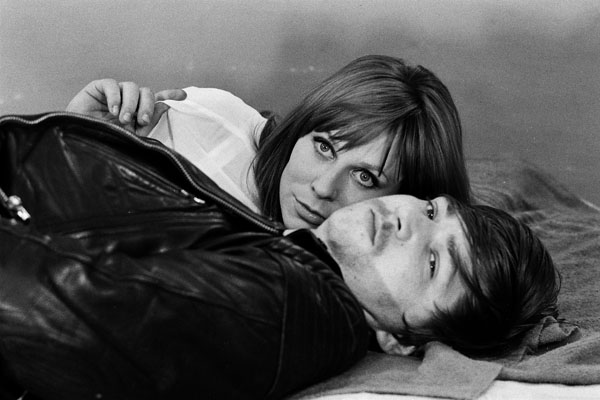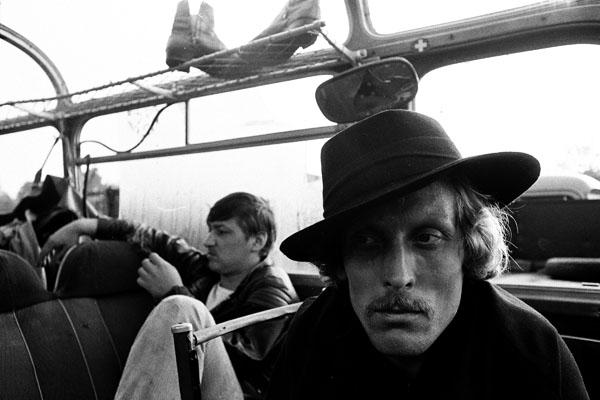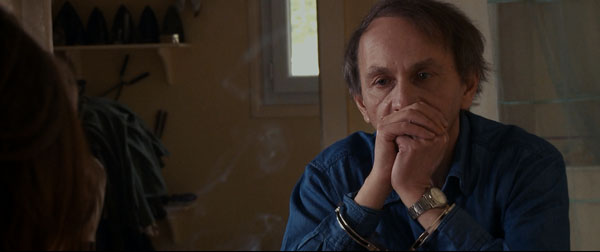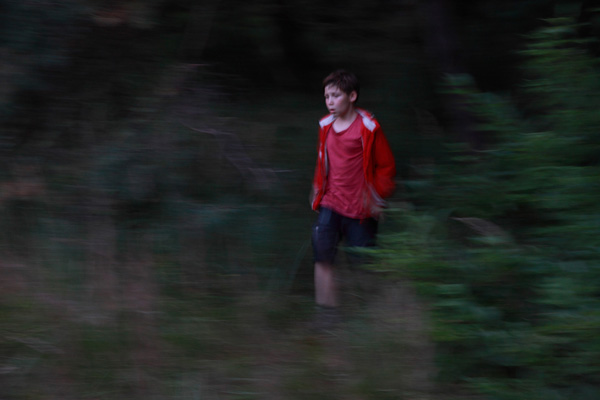About a month ago now, word was out that Volker Schlöndorff’s Baal (1969) with Rainer Werner Fassbinder in the title role was to return after spending over four decades stashed away in a vault. What’d happened was that the adaptation of Bertolt Brecht’s play, written in 1918 when he was 20, was broadcast on German television exactly once—in the spring of 1970. Brecht’s widow, Helene Weigel, watched it, hated it and demanded that it never be seen again. It was in her power to issue such a decree. Weigel died the following year and her daughter felt obligated to uphold her wishes. Long story short, Juliane Lorenz, head of the Fassbinder Foundation, eventually convinced her to change her mind.
The new restoration saw its premiere in Berlin this afternoon, and afterwards, Schlöndorff, Margarethe von Trotta, who plays Baal’s pregnant mistress Sophie, Hanna Schygulla, radiant in a a small role as a waitress, and Klaus Doldinger, who composed the music, took to the stage to chat a bit. Von Trotta noted how rattled she was to see that, in taking on the role of darkly romantic and furiously destructive poet and anarchist, Fassbinder was essentially playing himself. Schlöndorff concurred, but before that tangent could stretch too much further, Schygulla reminded the audience that not only were there other sides to RWF as well but also that we tend in hindsight to focus on the most sensational aspects of his character. He gave us great works of art, she said, and perhaps it’s time we express our gratitude by letting him rest in peace.
Baal is so endlessly fascinating as a document of its time, a record of an almost lost Fassbinder performance, a missing piece of New German Cinema history and a window onto Schlöndorff’s evolution as a director that it’s difficult to see the film itself through all that context. Especially since key members of RWF and Peer Raben’s Antiteater, brought forth from the ashes of Munich’s Action-Theater just the previous year, keep popping up in cameos. Raben himself, for example, and Irm Hermann, whose brief walk-on drew the warmest response from the audience. Individually and as an ensemble, these Antiteater troopers were enormously influenced by Brecht’s Verfremdungseffekt (alienation effect, based on the idea—well, to oversimplify—that to maintain awareness of the artificiality of a theatrical performance you need to distance an audience from emotional involvement). After Fassbinder, who snarls his way through the opening song, half-speaking and half-singing the lines over Doldinger’s very 1969-sounding rock soundtrack in a voice that’s always slightly higher than you remembered it before snapping at the women helplessly drawn to the animal magnetism he mercilessly flaunts and ruthlessly uses to manipulate all comers, Sigi Graue is the second most compelling performer. His Ekart turns Baal off women and onto men, a switch that, according to Schygulla, RWF argued Schlöndorff could never really wrap his head around.
What Schlöndorff could do quite well was make the most of very little. The schedule and budget were ridiculously tight, but Schlöndorff cut corners in the most effective and creative ways, such as by reframing within shots, moving in on a face (often in agony or resigned to defeat) or pulling back to take in reactions (often agonized or defeated) rather than having to shoot them separately. The biggest surprise for those (like me) who’d only seen stills until this afternoon is that Baal is in color. But certainly not flower power color; the dirt and mud of Baal’s beloved forests and the nicotine-stained back rooms of Gasthäuser where Baal drinks and shouts were influenced, says Schlöndorff, by the two great painters of the period of the play’s composition, George Grosz and Otto Dix.
WHAT OTHERS ARE SAYING
Update, 2/23: “Steeped in the vitality of Brecht’s youth, in his raw anger, it is the punkish anomaly, anarchistic violent and immoral, which cannot be easily explained by or assimilated into his later theorized Epic Theater,” writes Yaron Dahan in the Notebook. “This first play of Brecht’s lacks entirely that political clarity which defines many of his later works; its politics are rather its energy of refusal. It is a violent rejection of fascist drama, a rejection of bourgeois art-lovers, a rejection of linguistic placidity, and a bestial cry in the name of poetry at any cost. In Schlöndorff’s film, Rainer Werner Fassbinder does not just incarnate Baal’s spirit, he is Baal, and perhaps was even so inspired by this, his first filmic performance, that he assimilated this persona into his own life to the point in which Baal and R.W.F. become inseparable.”
If, at this year’s Berlinale, there’s a funnier film than The Kidnapping of Michel Houellebecq (L’enlèvement de Michel Houellebecq), I’ll be surprised, but of course, delighted. What’s to say to those unfamiliar with him about the ever-controversial award-winning French novelist, filmmaker, magician and poet whose daunting last name is pronounced “Wellbeck”? Perhaps it’s enough to note that fans once launched a magazine based on a movement they called “depressionism.”
In the opening credits, Houellebecq shares the “a film by” with director Guillaume Nicloux, and the two of them must have had a grand time dreaming up an alternative version of what the hell happened in the fall of 2011 when Houellebecq, who was supposed to be on a book tour, disappeared for a good number of days, prompting speculation in the French papers that he’d been taken hostage by al-Qaida. In the parallel universe of Kidnapping, the criminals—a boxer, a bodybuilder and their rotund brother—are anything but hardened thugs or terrorists.
It takes a while for the humor, and for that matter, genuine interest to kick in. We have to spend some time Houellebecq (or rather, “Houellebecq”) and get to know him before we can appreciate the absurdity of the countryside environment his kidnappers haul him off to; from there on in, the film becomes sort of a low-key Ruthless People, a case not so much of Stockholm Syndrome in reverse, but of the kidnappers and the kidnapped exerting influence on each other in perpetually surprising and drily funny ways.
WHAT OTHERS ARE SAYING
Kidnapping is “a wry, relaxed, extremely entertaining footnote to recent Gallic literary gossip,” writes Jonathan Romney for Screen Daily. “The no-frills low-budgeter from versatile writer-director Guillaume Nicloux—whose CV ranges from mainstream hit La Poulpe to severe literary adaptation The Nun—gives Houellebecq free range to send himself up in a film that has elements of mock-doc and traces of the French autobiographical-novel genre known as ‘autofiction.’ Most of all, though, the film plays like a Gallic answer to Curb Your Enthusiasm, with Houellebecq as a literary Larry David.”
Updates, 2/23: Jonathan Romney again, but here for Film Comment: “The cast of this seemingly part-improvised comedy—all, apart from Houellebecq, previously unknown to me—rise to the conceit with relaxed verve. But the star of the show so perfectly lives up to his myth as a sour, disdainful, prematurely wizened shambler that you find yourself wondering whether Nicloux has simply wheeled him on or whether the novelist is really pulling his own strings with sublime finesse. He oscillates between Andy Warhol blankness, a dandyish sullenness that Louis Garrel might envy, and the peppery universal contempt of Mark E. Smith.”
Kidnapping is “a slight, slyly amusing farce that could be described as a French intellectual’s equivalent of Michael Winterbottom’s Trip movies, by way of Michael Bay’s Pain & Gain,” writes Variety‘s Scott Foundas. “In what is effectively a one-joke movie, the joke is a good one.”
“This is an odd little French farce with decidedly niche appeal, but it will reward curious viewers with its understated humor and unexpected warmth,” writes Stephen Dalton in the Hollywood Reporter.
“Nothing happens and everything happens—and never an explanation of his kidnapping,” notes Tom Christie at Thompson on Hollywood. “What’s brilliant about it is even when you know in the back of your mind that you’re watching a fiction, you never for a moment feel it’s anything but an entirely plausible and enjoyable documentary. I’m still not absolutely certain.”
Andrew Pulver, who gives the film three out of five stars in the Guardian, interviews Houellebecq. And on a related note, Samuel Cooper for Hyperallergic: “The Scientific Artist: On Reading Michel Houellebecq.”
I’m fine with Jack, neither overly impressed nor terribly disappointed. One takeaway: Even in Berlin, the capital of Europe’s strongest economy, it’s possible to fall through the cracks if no one’s looking out for you. Jack is ten, his younger brother Manuel is a few years younger, and their single mom, fun and loving as she is, has a habit of abandoning them for days on end. The odyssey director Edward Berger and co-writer Nele Mueller-Stöfen send these boys on is propelled by Ivo Pietzcker’s confident portrayal of Jack, Jens Harant’s cinematography and Kirsten Kunhardt’s sound design.
Otherwise, I find that I’m pretty much in sync with Guy Lodge on this one, so to segue straight into…
WHAT OTHERS ARE SAYING
Guy Lodge in Variety: “The burden of having a child for a mother weighs heavily on Jack, an affecting but unsurprising slice of German social realism that takes significantly fewer chances than its scrappy eponymous protagonist. This third feature from NYU-schooled, Berlin-based helmer Edward Berger nods credibly to the Dardenne brothers and Ken Loach in its unhappy (if not unhopeful) portrait of a loving single-parent family split by fecklessness and bad fortune, but is short on character development and socio-economic texture.”
It’s “made with sensitivity, skill and honesty,” grants Leslie Felperin in the Hollywood Reporter. “However, it doesn’t really say anything new, especially when compared with, say, the recent Short Term 12 or Ursula Meier’s Sister, the latter another Berlin competitor made a couple years back, which covered similar ground with more bite.”
Still, for Screen‘s Mark Adams, Jack “demands attention thanks to its stark and unsentimental story.” More from Stefan Dobroiu at Cineuropa.
A few quick Berlinale-in-general notes here. Indiewire‘s Eric Kohn is arguing today that, while “the Berlinale may not carry the same obvious clout as Sundance or Cannes, it deserves just as much scrutiny—if not more so—for the broad statement it provides on global cinema today.”
You don’t need to read German to check in occasionally on the grid of grades that’s upgraded with alarming frequency at Critic.de. Nine of us in all are sending them in throughout each day.
If you can read German, though, you’ll want to see Perlentaucher‘s ongoing blog, Critic.de‘s recommendations and Cargo‘s text messages.
For news and tips throughout the day every day, follow @KeyframeDaily on Twitter and/or the RSS feed. Get Keyframe Daily in your inbox by signing in at fandor.com/daily.







